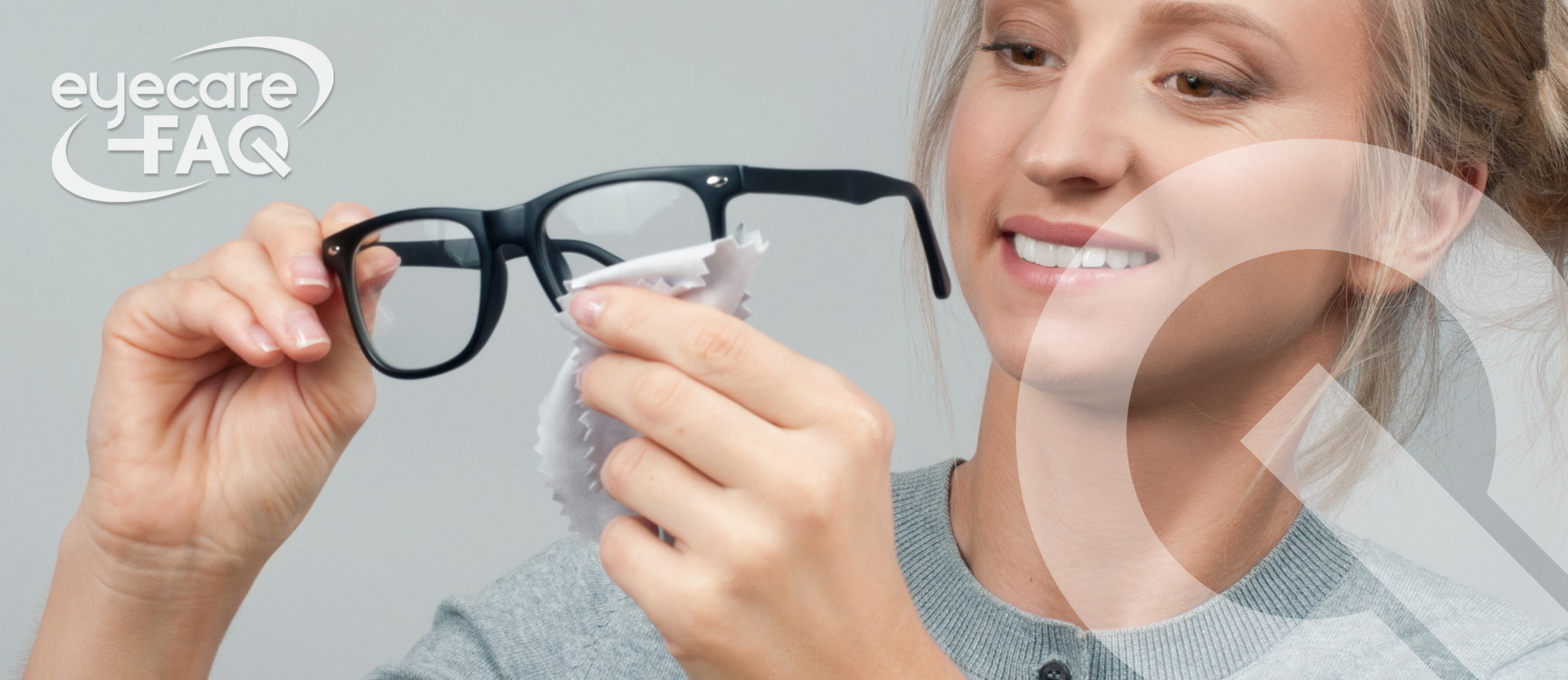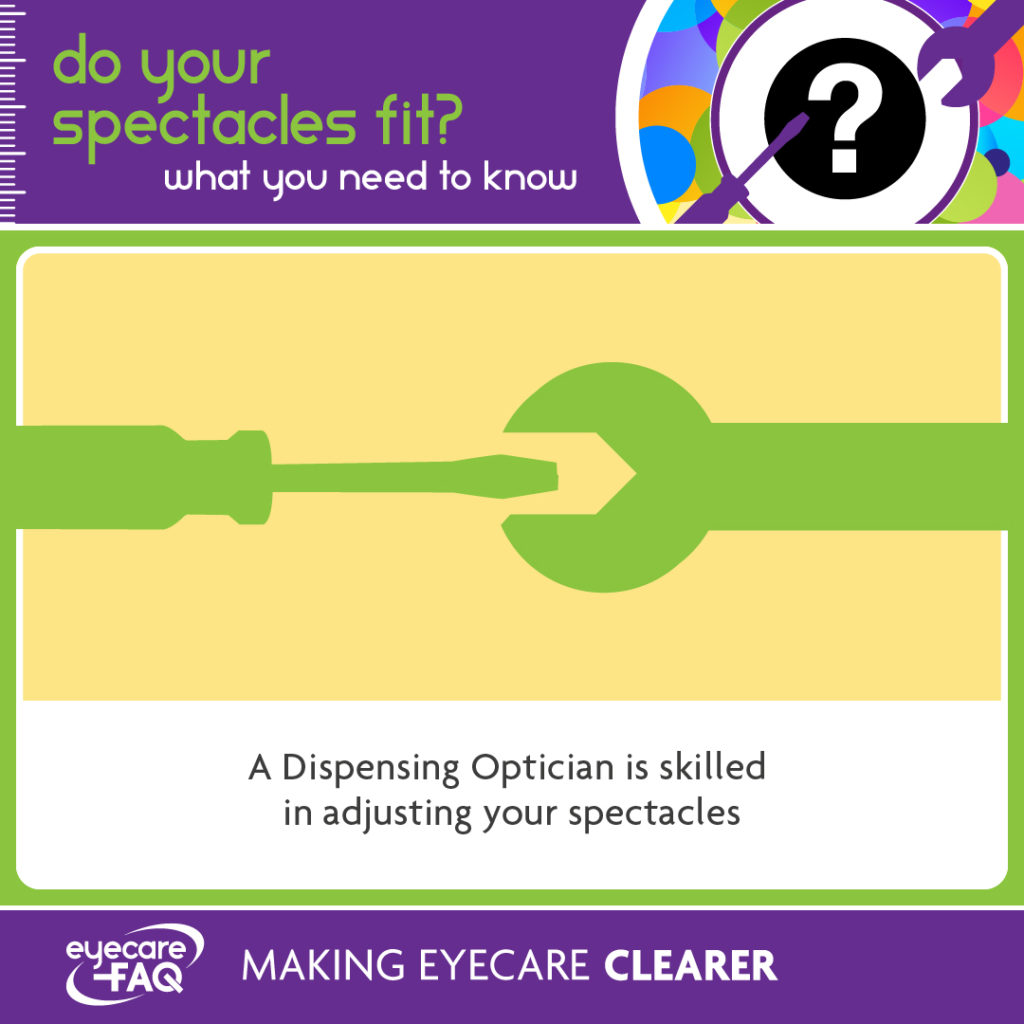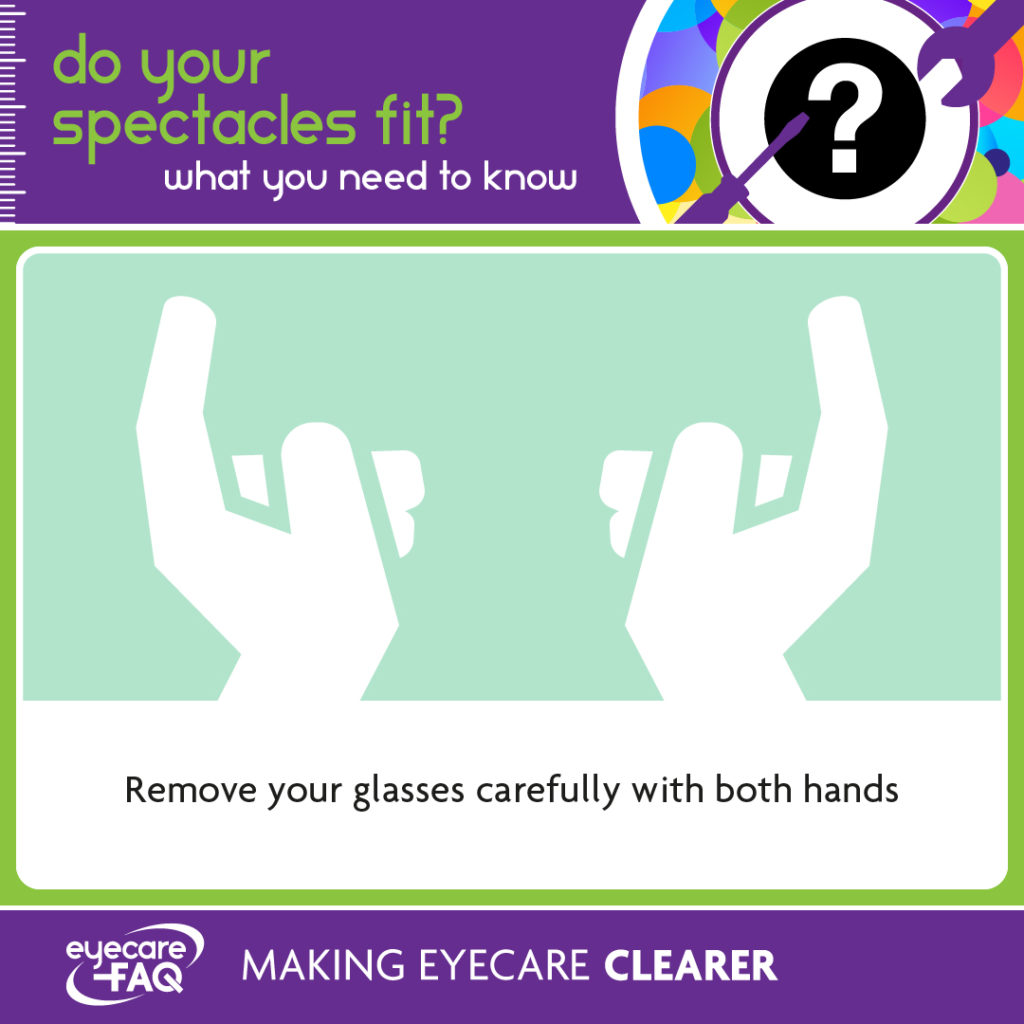What happens when my specs are ready to collect?
When you hear from your optician that your specs are ready to collect, they will let you know if they need you to make an appointment for fitting, or whether to just drop in. Some practices have a registered dispensing optician on the premises during all their opening hours to fit your specs.
An optician must be present when children and people who are registered blind (‘severely sight impaired’) or partially sighted (‘sight impaired’) collect their specs. Opticians are trained to make sure that everyone’s specs fit well.
At the practice, the optician will place your specs on your face, and check that they are level. They may then remove the frame to gently warm the sides to enable adjustment so that they fit well behind your ears. They may use pliers on a metal frame to adjust the side and nose pieces to facilitate the correct fitting requirements. They will also make sure that the centre of the lenses are aligned with the centre of your eyes. This is vital to help you make the most of your specs. If you wear bifocals or varifocals, you may notice the optician adjusting the height of the specs to ensure that you are looking through the correct parts of the lens for distance and close work.
After your specs have been fitted you will have the chance to assess your vision wearing your new specs. Remember that it can take time to get used to new glasses, particularly if there has been a big change in prescription, or if you are wearing multifocal lenses for the first time. Take them home and wear them for a few days, and return to your optician should think the specs need further adjustment, or you feel your vision is not as it should be.
You will be given a case and cleaning cloth to help you look after your new specs, so give appropriate care to ensure they have a long working life.
Your dispensing optician will always be happy to provide regular adjustments so you can make the most of your glasses.
My specs don’t fit quite right, what should I do?
Sometimes glasses need adjusting. It may be that you have collected new specs recently and feel that they are not quite as comfortable as they could be, or alternatively if you have had them a long time and they have recently started to slip or rub. Whatever the situation, just visit the practice where you purchased your specs and ask for an adjustment. The dispensing optician will assess how the specs fit on your face. They may use pliers to adjust metal frames, or warm up plastic frames so that they can be manipulated to fit better. It is a skilled task to ensure that specs align properly on the wearers face, and one that may need to be repeated again after specs have been worn for a while, to ensure that you always have the optimum fit.
Find out more about how your specs should fit here.
How should I remove my spectacles?
It may seem like a simple question, but in fact there is a right and a wrong way to remove spectacles. Taking your specs off with one hand, will, over time, mean that the hinges stretch on that side, Take them off with two hands will ensure that they stay in good shape for longer. If you are worried that your specs no longer fit well, don’t panic. Simply call in and see the Dispensing Optician and ask for your specs to be adjusted.
How should I clean my glasses?
Everyone’s specs need a clean from time to time. When you purchased your specs it is likely that you were given a special soft cleaning cloth to use. Alternatively, these cloths are available to purchase from any optician’s practice.
To clean your specs there are sprays specially formulated for either coated or uncoated lenses. Spray each side of the lens and rub gently towards the rim of the frame/lens edge and wipe dry with the lens cloth.
If you have any concerns about cleaning your specs, ask to speak to the registered dispensing optician at the practice where you got them. They will be happy to advise you.
What happens when spectacles get misty?
Your spectacles fog up because the steam or vapour in the warm air hits your cold glasses and turns into droplets of water. This often happens when you come indoors after being out in the cold or when you open your oven door. If this happens to you remove your specs and wipe them with a spectacle cleaning cloth.
What should I do if I have lost my glasses?
If you have lost your glasses, the first thing to do is speak to your optician. If you have had your eyes tested recently, ie within the last year or so, they may be able to make you an identical pair. If it is longer than that, or your eyesight changes rapidly, they will advise you to have another eye test to check for any changes.
Some practices glaze spectacles on their own premises and can make up a new pair of spectacles for you in a just few hours. More complex lenses, such as bifocals, varifocals, and higher prescriptions may need to be ordered from a laboratory and you will be advised how long they will take to arrive. Other practices send all their orders to a laboratory.
If you are away from home when you lose your specs, look for a local optical practice. They may need to phone your regular practice to find your spectacle prescription and the types of spectacles that you were wearing, or may be able to test your eyes. It can help to keep a copy of your latest prescription in your bag or wallet.
Of course, a spare pair of specs can help you while you wait for a replacement pair. Ask your optician if they have any offers on second pairs of glasses, or opt to have the lenses updated in an old pair of frames that is still in good condition to make them into a useful spare.
Whatever your questions about lost glasses, remember that your local, registered, dispensing optician will do their best to help you resolve the issue.
What should I do if I have a problem with my optician?
Most of the time, everything goes smoothly when you visit your optician. If, however, you have a problem with your eye care or eyewear, the first thing to do is to go back to the practice and explain the problem. In most cases you will be able to resolve your concerns.
When a complaint cannot be resolved, then the Optical Consumer Complaints Service (OCCS) offers an impartial mediation facility to help you obtain a satisfactory outcome. OCCS aims to:
- Listen to you and work out what has gone wrong
- Identify the key issues of your complaint and what you are hoping to achieve by pursuing the complaint
- Obtain all the relevant information from the practice
- Identify common ground
- Help find a solution which both sides can accept – this may be a refund, replacement or repeat procedure, an apology or explanation of what has happened and why
To find out more, visit www.opticalcomplaints.co.uk.
If you are concerned that an optical professional is not fit to practice, you can complain to the General Optical Council (GOC). All opticians have to be registered with the GOC. The GOC will investigate complains concerning matters including:
- Poor professional performance
- Physical or mental health problems affecting their work
- Inappropriate behaviour
- Being under the influence of alcohol or drugs at work
- Fraud or dishonesty
Find out more about making a complaint here.


